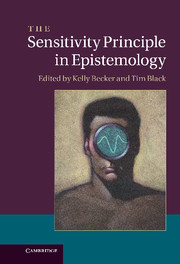15 results
Contributors
-
-
- Book:
- The Behavioral and Cognitive Neurology of Stroke
- Published online:
- 05 March 2013
- Print publication:
- 28 February 2013, pp vii-x
-
- Chapter
- Export citation
The Sensitivity Principle in Epistemology - Title page
-
-
- Book:
- The Sensitivity Principle in Epistemology
- Published online:
- 05 September 2012
- Print publication:
- 02 August 2012, pp iii-iii
-
- Chapter
- Export citation
Part I - Defenses, applications, explications
-
- Book:
- The Sensitivity Principle in Epistemology
- Published online:
- 05 September 2012
- Print publication:
- 02 August 2012, pp 9-98
-
- Chapter
- Export citation

The Sensitivity Principle in Epistemology
-
- Published online:
- 05 September 2012
- Print publication:
- 02 August 2012
Index
-
- Book:
- The Sensitivity Principle in Epistemology
- Published online:
- 05 September 2012
- Print publication:
- 02 August 2012, pp 278-281
-
- Chapter
- Export citation
Contents
-
- Book:
- The Sensitivity Principle in Epistemology
- Published online:
- 05 September 2012
- Print publication:
- 02 August 2012, pp v-vi
-
- Chapter
- Export citation
The Sensitivity Principle in Epistemology - Half title page
-
- Book:
- The Sensitivity Principle in Epistemology
- Published online:
- 05 September 2012
- Print publication:
- 02 August 2012, pp i-ii
-
- Chapter
- Export citation
Copyright page
-
- Book:
- The Sensitivity Principle in Epistemology
- Published online:
- 05 September 2012
- Print publication:
- 02 August 2012, pp iv-iv
-
- Chapter
- Export citation
Contributors
-
-
- Book:
- The Sensitivity Principle in Epistemology
- Published online:
- 05 September 2012
- Print publication:
- 02 August 2012, pp vii-viii
-
- Chapter
- Export citation
Part III - In favor of safety over sensitivity
-
- Book:
- The Sensitivity Principle in Epistemology
- Published online:
- 05 September 2012
- Print publication:
- 02 August 2012, pp 171-226
-
- Chapter
- Export citation
Part IV - Sensitivity without subjunctives
-
- Book:
- The Sensitivity Principle in Epistemology
- Published online:
- 05 September 2012
- Print publication:
- 02 August 2012, pp 227-268
-
- Chapter
- Export citation
Chapter 1 - The resilience of sensitivity
-
-
- Book:
- The Sensitivity Principle in Epistemology
- Published online:
- 05 September 2012
- Print publication:
- 02 August 2012, pp 1-8
-
- Chapter
- Export citation
Part II - Criticism
-
- Book:
- The Sensitivity Principle in Epistemology
- Published online:
- 05 September 2012
- Print publication:
- 02 August 2012, pp 99-170
-
- Chapter
- Export citation
Chapter 3 - Sensitivity meets explanation:
- from Part I - Defenses, applications, explications
-
-
- Book:
- The Sensitivity Principle in Epistemology
- Published online:
- 05 September 2012
- Print publication:
- 02 August 2012, pp 28-42
-
- Chapter
- Export citation
Bibliography
-
- Book:
- The Sensitivity Principle in Epistemology
- Published online:
- 05 September 2012
- Print publication:
- 02 August 2012, pp 269-277
-
- Chapter
- Export citation



